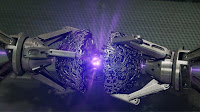Okay, it’s been a while since we had some solid, deep, digging-in-the-gross-stuff discussion about writing. So let’s get back to basics, shall we…?
 A couple years back I had the fantastic opportunity to spend about an hour on the phone with Shane Black. If you don’t know his name off the top of your head, he’s the writer-director behind (among others) Lethal Weapon, Kiss Kiss Bang Bang, Iron Man 3, and just recently The Nice Guys. He knows a lot about storytelling, and during our talk he tossed out a dozen or so useful lessons, one of which I’d like to share with you.
A couple years back I had the fantastic opportunity to spend about an hour on the phone with Shane Black. If you don’t know his name off the top of your head, he’s the writer-director behind (among others) Lethal Weapon, Kiss Kiss Bang Bang, Iron Man 3, and just recently The Nice Guys. He knows a lot about storytelling, and during our talk he tossed out a dozen or so useful lessons, one of which I’d like to share with you. Yeah, I’ve talked about this before, but I came up with some new ways to talk about it, and I figured it’s a good refresher…
Pretty much any book, movie, television episode, or short story can be broken down into two parts—the plot and the story. The plotis the events and moments going on outside my characters. The story is all the events and moments that are going on inside my character.
Here’s another way to look at it—plot can affect lots of people, but the story is mostly going to affect my character. A bomb going off is going to affect hundreds of people. Phoebe marrying Wakko instead of me is mostly going to affect… me.
Let’s go into some more detail.
Plotis the external threats and goals in my book. Most books tend to have the plot scribbled out on the inside flap (the jacket copy, they like to call it). If I pick up a BluRay, they’ve usually got the plot of the movie or show on the back. For example (using a book I’ve mentioned recently), the plot of Anamnesis is about a bottom-tier drug dealer, Ethan, who tries to learn more about a custom drug that’s appearing on the streets, and then has to try to save himself when he discovers some of the people behind this drug.
 After looking at a lot of books or movies from the storytelling point of view, one thing I noticed is that the plot is almost always an attempt to do something. Win the big race, get the guy, stop the villain, save the orphanage, save the world. As I mentioned above, the plot involves a goal, and any decent goal in my story is going to take some effort to achieve.
After looking at a lot of books or movies from the storytelling point of view, one thing I noticed is that the plot is almost always an attempt to do something. Win the big race, get the guy, stop the villain, save the orphanage, save the world. As I mentioned above, the plot involves a goal, and any decent goal in my story is going to take some effort to achieve. Another thing I’ve noticed is that plot tends to get a bad rap. A lot of artsy folks will scoff at the idea of “plot,” like it’s some crude tool that only hack writers use. Which is just wrong–plot’s an essential part of storytelling–all storytelling.
Now, in all fairness, there are a decent number of “plot-heavy” films and books out there. The characters are kind of… well, irrelevant. And these tales might be great to kill an afternoon with, but that’s all they’re ever going to be. To anyone.
As it happens, though, a lot of those artistic “character based” works of film and literature tend to meander and not really, y’know, go anywhere. I think that’s because of the refusal to have a plot. As I mentioned above, plot means the characters are trying to do something, so “no plot” means the characters are… well… not doing anything.
Now, in all fairness, there are a decent number of “plot-heavy” films and books out there. The characters are kind of… well, irrelevant. And these tales might be great to kill an afternoon with, but that’s all they’re ever going to be. To anyone.
As it happens, though, a lot of those artistic “character based” works of film and literature tend to meander and not really, y’know, go anywhere. I think that’s because of the refusal to have a plot. As I mentioned above, plot means the characters are trying to do something, so “no plot” means the characters are… well… not doing anything.
That brings us, nicely, to story. Story is the flipside of plot. It’s all the internal desires and needs and struggles of my characters. It’s a big part of the character arcand the reasons behind that arc. Story tends to be what we tell our friends about when we explain why we like a character. We enjoy the plot, but what we get invested in is the story.
To use Anamnesisagain, Ethan’s story is that he suffers from severe retrograde amnesia—for all purposes his life began just a few years ago when he woke up on a beach. So the memory-erasing drug that appears on the street—and the people suffering from its effects—strikes a chord. He feels compelled to help them, even though it’s really not in his best interests.
Every now and then, you might hear someone say there’s really only seven plots (or six or nine or something) and there’s a bit of truth to that. The reason there are millions of different books, though, is because of story. If I drop two different characters into the same situation, I’m going to get radically different results, because they’re going to approach things… well, differently. If Peggy Carter had gotten the super soldier formula instead of Steve Rogers, Captain Americawould’ve been a radically different movie, on a bunch of levels. An example I’ve used before is Never Let Me Go and The Island, two movies with almost exactly the same plot but very different stories. End result–two very different movies.
I’ve talked a few times about working on Ex-Isle, which came out back in February. One thing I realized as I started the second draft was that I had a plot, but no real story. What was going on inside St. George, one of my main characters, while the plot progressed around him? And figuring out his story (his ongoing need to help people vs. how his position and purpose at the Mount was changing) helped solve some knots and eventually even changed the ending of the book.
Now, let’s play with this a bit…
Who’s heard of the Moonlighting curse? It’s the idea that if you have a TV show with a strong “will they or won’t they” element, it’ll collapse as soon as they do. It happened famously with Moonlighting and more recently, alas, with my beloved Castle.
But we’re talking about this as writers. So… whydo these shows collapse at this point?
 The plot of Castle is that a wildly popular crime novelist (Richard Castle) ends up working with the homicide department of New York’s 5th precinct. His personality grates on them a lot, but they can’t deny he has a quick mind and some amazing insights into human psychology and criminal motives. Plus, he’s friends with the mayor… so they’re kinda stuck with him as long as he wants to be there.
The plot of Castle is that a wildly popular crime novelist (Richard Castle) ends up working with the homicide department of New York’s 5th precinct. His personality grates on them a lot, but they can’t deny he has a quick mind and some amazing insights into human psychology and criminal motives. Plus, he’s friends with the mayor… so they’re kinda stuck with him as long as he wants to be there. The story of Castle is about the developing relationship between many-times-married Castle and married-to-her-job homicide detective, Kate Beckett. They each have a lot of baggage, but they also have a lot of chemistry. And the chemistry kept growing even as they came to accept (and even admire) each other’s quirks and hangups.
All sounds great, right? But does anyone see the problem? It’s something we’ve talked about before…
See, the basic plot of Castle is pretty much infinite. I think we can all agree there’s no foreseeable future where New York City is going to have a drastic shortage of homicides. So that part of the series can keep going forever.
But… the story of Castle pretty much ends once Castle and Beckett become a couple. Our whole story was “will they or won’t they,” so once they do… that’s it. Done. My story’s over. Sure, in some cases we can stretch things out a bit with all the usual new-relationship stuff (early riser vs. late, snoring, family and friend approval, toothbrushes, how far is this going, etc.), but the longer a series runs, odds are a lot of that will already be established and resolved. Hell, before the two of them ever kissed, I think Becket had celebrated three or four Christmases with Castle, his daughter, and his mom.
 Y’see, Timmy, the plot of Castle was still going, but the story’d come to an end. Which means the series either stumbled into that plot-heavy area I talked about up above… or it came up with a reason to extend the story. And as we’ve talked about in the past, that kind of artificial extension usually doesn’t go over well.
Y’see, Timmy, the plot of Castle was still going, but the story’d come to an end. Which means the series either stumbled into that plot-heavy area I talked about up above… or it came up with a reason to extend the story. And as we’ve talked about in the past, that kind of artificial extension usually doesn’t go over well. So, plot and story. Every good tale should have both. They can overlap. They can intertwine. But if I’m missing one or the other, no matter how many excuses I want to make… my work’s going to be lacking. And my audience is going to be able to tell.
Next time…
Well, next time is going to be a few days before Christmas. And Hanukkah. We’ll all have things to do, so I’ll try to do something brief.
Until then… go write.










